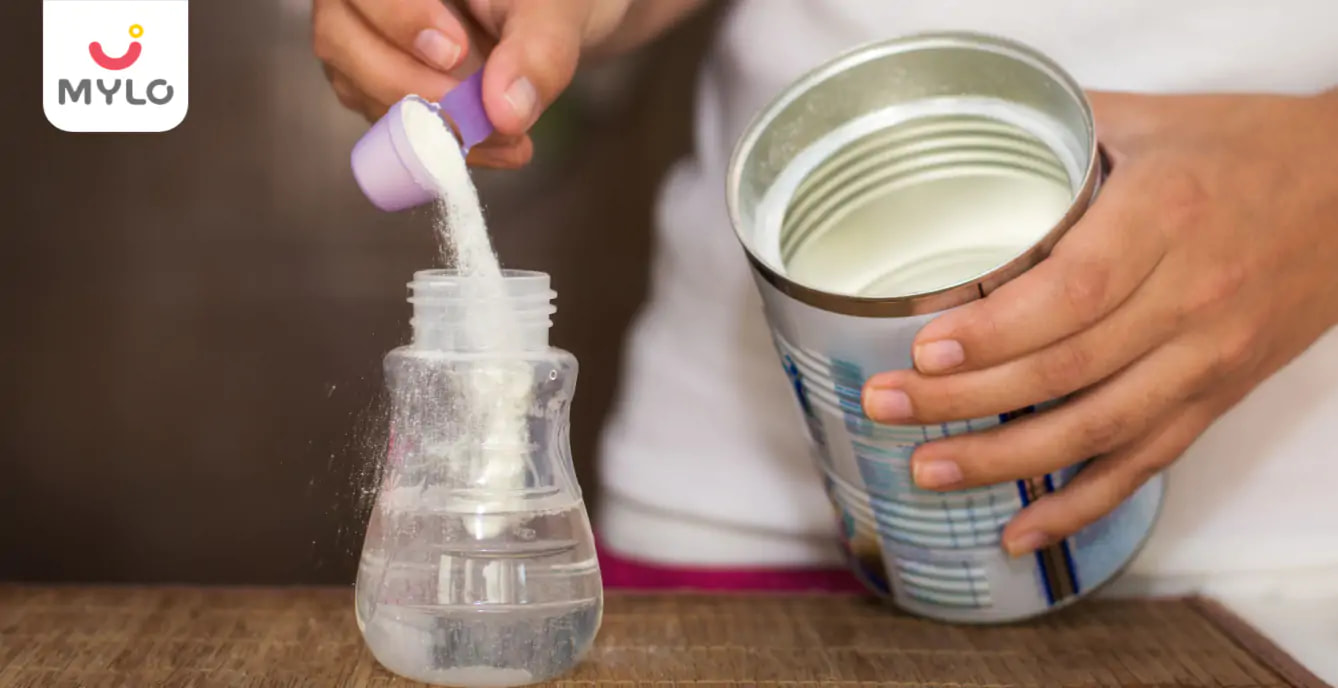Get MYLO APP
Install Mylo app Now and unlock new features
💰 Extra 20% OFF on 1st purchase
🥗 Get Diet Chart for your little one
📈 Track your baby’s growth
👩⚕️ Get daily tips

OR


Article Continues below advertisement
- Home

- The Ultimate Guide to Formula Milk: Everything You Need to Know
In this Article
- What is Formula Milk?
- Formula vs. Breast Milk - What's the Difference?
- Understanding the Nutrients in Formula Milk
- 1. Carbohydrates
- 2. Fats
- 3. Proteins
- 4. Vitamins and minerals
- Advantages and Disadvantages of Formula Milk
- How to Choose the Right Formula Milk Powder for Your Baby?
- 1. Age of your baby
- 2. Allergies or intolerances
- 3. Nutritional content
- Tips for Transitioning from Breast Milk to Formula Milk
- Preparing Formula Milk - Step-by-Step Guide
- How Long Formula Milk Can be Stored?
- FAQs
- 1. Is formula milk good for baby?
- 2. Can I breastfeed and use formula?
- 3. When should I start feeding my baby formula?
- 4. Which formula milk is best in India?
- The Bottomline
- References
Baby Care
The Ultimate Guide to Formula Milk: Everything You Need to Know
Updated on 20 February 2024



Medically Reviewed by
Kusum Sabharwal
Obstetrician & Gynecologist - MBBS| DGO
View Profile

Are you a new parent struggling to decide whether to breastfeed or use formula milk for your little one? Or maybe you're a busy parent who needs to supplement their baby's diet with formula milk? Whatever your situation may be, choosing the right formula milk powder for your baby can be overwhelming. With so many options available, it's hard to know where to start. But don't worry, we've got you covered!
In this ultimate guide, we'll walk you through everything you need to know about formula milk. From understanding the different types of formula and the advantages and disadvantages of formula milk to finding the right one for your baby's needs, we've got all the information you need to make an informed decision. Let's dive in!
What is Formula Milk?
Formula milk is a type of baby food that is designed to provide infants with the essential nutrients required for healthy growth and development. It is available in powdered, liquid, and ready-to-use forms. It contains a blend of carbohydrates, fats, and proteins, along with vitamins and minerals.
Article continues below advertisment
Formula milk is used as a substitute for breast milk, either due to an inability to breastfeed or by choice. It is essential to choose the right type of formula milk for your baby, as it will provide the necessary nutrients for their growth and development.
Formula vs. Breast Milk - What's the Difference?
Formula milk and breast milk are both designed to provide infants with the necessary nutrients for growth and development. However, there are some differences between the two.
Breast milk is the most nutritionally complete food for infants and provides antibodies that help to build their immune system. It also provides a bonding experience between mother and baby. Formula milk, on the other hand, is a convenient alternative to breast milk and is easier to digest.
You may also like: Breastfeeding and Formula Feeding Schedules
Understanding the Nutrients in Formula Milk
Formula milk is designed to provide infants with the essential nutrients required for healthy growth and development. The nutrients found in formula milk include the following:
Article continues below advertisment
1. Carbohydrates
Carbohydrates are the primary source of energy for infants and are found in the form of lactose in formula milk.
2. Fats
Fats are essential for brain development and provide a source of energy for infants.
3. Proteins
Proteins are necessary for muscle and tissue growth, and they help to build the immune system.
4. Vitamins and minerals
Vitamins and minerals are essential for overall growth and development and help to keep the body healthy.
Advantages and Disadvantages of Formula Milk
Formula milk has both advantages and disadvantages.
Article continues below advertisment
-
One advantage of formula milk is that it provides a convenient alternative to breast milk, allowing parents to feed their babies when and where they choose.
-
Formula milk is also easier to digest than cow's milk, making it a better option for infants.
However, formula milk also has some disadvantages.
-
One of the main disadvantages is that it is not as nutritionally complete as breast milk.
-
Additionally, formula milk can be expensive, and it does not provide the same bonding experience between mother and baby that breastfeeding does.
Article continues below advertisment
How to Choose the Right Formula Milk Powder for Your Baby?
Choosing the right formula milk for your baby is essential for their growth and development. There are several factors to consider when choosing formula milk powder such as:
1. Age of your baby
It is important to choose a formula that is age-appropriate for your baby. There are different types of formula powder available for different stages of development.
2. Allergies or intolerances
If your baby has allergies or sensitivities to certain ingredients, consider specialized formulas that are available for babies with allergies or lactose intolerance.
3. Nutritional content
Look for a formula that provides adequate nutrition to your baby. Most formulas are fortified with iron, DHA, and ARA, which are essential nutrients for your baby's growth and development.
You may also like: The Ultimate Guide to Choosing the Right Feeding Bottle for Your Baby
Article continues below advertisment
Tips for Transitioning from Breast Milk to Formula Milk
Transitioning from breast milk to formula milk can be a challenging process for both parents and infants. It is essential to take the transition slowly and gradually introduce formula milk to your baby.
One tip for transitioning from breast milk to formula milk is to introduce formula milk powder in small amounts and gradually increase the amount over time. Another tip is to mix breast milk and formula milk to help your baby adjust to the new taste and texture.
You may also like: Do You Want An Easy Transition from Breastfeeding to Bottle-Feeding?
Preparing Formula Milk - Step-by-Step Guide
Preparing formula milk may seem daunting at first, but it is a straightforward process. To prepare formula milk, you will need formula milk, water, and a bottle.
- First, wash your hands and sterilize all equipment.
- Boil fresh water and allow it to cool to the appropriate temperature, as stated on the formula milk packaging.
- Add the correct amount of formula milk powder to the water and mix well.
- Check the temperature of the formula milk before feeding it to your baby.
You may also like: How To Feed A Newborn Baby?
Article continues below advertisment
How Long Formula Milk Can be Stored?
Formula milk can be stored in the fridge for up to 24 hours and in the freezer for up to one month. It is important to store formula milk correctly to maintain its quality and safety.
To store formula milk, it is best to use an airtight container and label it with the date and time it was prepared. Formula milk should be stored in the back of the fridge, away from other food items.
FAQs
1. Is formula milk good for baby?
Yes, formula milk is a healthy alternative for mothers who cannot or choose not to breastfeed. However, health experts generally recommend breastfeeding due to its nutritional value and other benefits.
2. Can I breastfeed and use formula?
Yes, you can breastfeed and use formula at the same time. This practice is known as combination feeding or supplementing.
3. When should I start feeding my baby formula?
If you choose to feed your baby formula, you can start from the first days of life or as recommended by your doctor. Newborns have tiny stomachs and will need to be fed 8 to 12 times a day.
Article continues below advertisment
4. Which formula milk is best in India?
The best formula milk powder contains a mix of nutrients like protein, lactose, prebiotics, DHA, iron, vitamins, and fatty acids, which aim to promote brain development, boost immunity, support digestion, and aid in weight gain.
The Bottomline
Choosing between breast milk and formula milk is a personal choice for parents. It is essential to choose the option that is best for your baby's health and wellbeing. Whether you choose to breastfeed or use formula milk powder, the most important thing is to ensure that your baby is receiving the necessary nutrients for healthy growth and development.
References
1. Koletzko B, Shamir R. (2006). Standards for infant formula milk. BMJ.
2. Cheng H, Rossiter C, Size D, Denney-Wilson E. (2022). Comprehensiveness of infant formula and bottle feeding resources: A review of information from Australian healthcare organisations. Matern Child Nutr.
Article continues below advertisment





Medically Reviewed by
Kusum Sabharwal
Obstetrician & Gynecologist - MBBS| DGO
View Profile


Written by
Mylo Editor
Official account of Mylo Editor
Read MoreGet baby's diet chart, and growth tips

Related Articles
RECENTLY PUBLISHED ARTICLES
our most recent articles

Are baby monitors safe or dangerous for your little ones? How to protect your baby from EMF Radiations?

Motor Skills
Here’s a List of a Lot of Things That You Need to Know When Your Baby Starts Rolling Over

Travel & Holidays
How to Travel Around the World Stress-Free With Your Baby?

Sex Life
গর্ভবতী হওয়ার জন্য প্রধান 10টি যৌন অবস্থান: গর্ভধারণের চেষ্টাকারী দম্পতিদের জন্য আলোচনা | Top 10 Sex Positions to Get Pregnant: The Ultimate Guide for Couples Trying to Conceive in Bengali

Announcements & Celebrations
Welcoming New Born Baby Quotes to Celebrate Life's Greatest Gift

Announcements & Celebrations
It's a Baby Girl! 50+ Ideas for Announcing Your Daughter's Birth
- Never Miss These Crucial Warning Signs of Emotional Development Problems in Your Baby
- The Ultimate Guide to Using Almond Oil for Baby Massage
- An ultimate guide about health, growth, and care for a 7-weeks-old baby
- Posterior Placenta: A Comprehensive Guide for Moms-to-Be
- Let's know more about the growth and development of the brain in infants and early childhood.
- Postnatal Care in India
- Low Birth Weight: Causes, Complications & Treatment
- Laparoscopic Ovarian Drilling: A Safe and Effective Solution for PCOS-Related Infertility
- Headache During Pregnancy: The Ultimate Guide to Causes and Cures
- Fetal Doppler Scan During Pregnancy: In which week should you get it done?
- How Long Should Naps Be While Pregnant?
- Blocked Fallopian Tubes: How They Affect Your Chances of Conceiving
- How Do You Notify Your Employer That You Are Pregnant?
- The Ultimate Guide to Consuming Tapioca During Pregnancy


AWARDS AND RECOGNITION
Mylo wins Forbes D2C Disruptor award
Mylo wins The Economic Times Promising Brands 2022
AS SEEN IN
















At Mylo, we help young parents raise happy and healthy families with our innovative new-age solutions:
- Mylo Care: Effective and science-backed personal care and wellness solutions for a joyful you.
- Mylo Baby: Science-backed, gentle and effective personal care & hygiene range for your little one.
- Mylo Community: Trusted and empathetic community of 10mn+ parents and experts.
Product Categories
baby carrier | baby soap | baby wipes | stretch marks cream | baby cream | baby shampoo | baby massage oil | baby hair oil | stretch marks oil | baby body wash | baby powder | baby lotion | diaper rash cream | newborn diapers | teether | baby kajal | baby diapers | cloth diapers |







